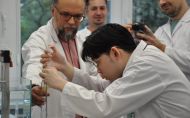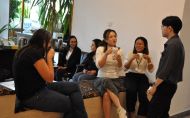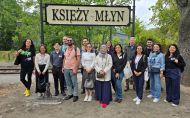The event, which included lectures, calculation exercises, laboratory activities, and a seminar, was attended by young researchers and engineers from 12 countries across South America, Asia, and Europe. The lecturers and instructors included MITR staff and doctoral candidates, Prof. Joanna Pietrasik from the Institute of Polymer and Dye Technology, and a guest from France, Prof. Xavier Coqueret from the University of Reims, who has had long-standing collaboration with Lodz University of Technology (TUL).
At the MITR laboratories
The workshop program was intensive yet varied. In addition to enhancing their knowledge through lectures, participants spent significant time in MITR laboratories conducting experiments and taking measurements. They worked on projects such as developing smart hydrogel materials for medical applications using radiation technology and producing and studying elicitors – biocompatible substances that can replace synthetic pesticides.
MITR's laboratories are very well equipped, both with various sources of ionizing radiation and with equipment capable of monitoring radiation processes in different types of polymeric systems. The MITR staff assisted participants in interpreting results and offered daily consultations throughout the workshop.
The workshop also featured calculation exercises, which addressed not only chemical but also economic aspects of selected radiation technologies. One day was dedicated to presentations of participants' own work, providing a valuable opportunity for everyone to learn from each other.
IAEA for global peace
The International Atomic Energy Agency, which invited us to organize this workshop, is a specialized UN organization dedicated to the peaceful use of atomic energy. It currently has 176 member states. In recognition of its contributions to the development of radiation and nuclear research and technology, its support for countries where these technologies are in early stages of development and implementation, its promotion of radiation safety principles, and its role in monitoring compliance with international laws and sanctions that prevent nuclear weapons production, the IAEA was awarded the Nobel Peace Prize in 2005. IAEA inspectors are currently stationed at Ukrainian nuclear power plants on a permanent basis.
Scientific and expert cooperation with IAEA
Lodz University of Technology has been cooperating with the IAEA for over 30 years, with the initial collaboration led by Prof. Janusz Rosiak, who passed away recently. At first, we mainly benefited from IAEA programs, but we have long supported the organization's activities, for example by hosting long-term internships for individuals referred by the IAEA (more than 30 interns from Europe, Africa, Asia, and South America), participating in international research programs and educational activities, co-organizing conferences, and contributing to monographs and textbooks published by the IAEA.
MITR staff also play an important advisory role for the IAEA, serving as consultants and experts. In this capacity, they have conducted more than 30 technical missions in 20 countries, acted as lecturers at many IAEA courses, and contributed to the programs of major periodic conferences organized by the agency, such as the International Conference on Applications of Radiation Science and Technology (ICARST), which attracts around 800 participants.
We also collaborate with the IAEA in emergency situations. After the outbreak of the pandemic, when there were concerns about whether global production of masks, gowns, gloves, and other personal protective equipment (PPE) would keep up with demand, the IAEA asked five leading laboratories to urgently test whether these PPE items could be safely and effectively sterilized using radiation for potential reuse. Our laboratory was among the selected group (in cooperation with colleagues from the Faculty of Material Technologies and Textile Design), and within two weeks, we co-hosted a teleconference for IAEA member countries to present the results of our research.
Impressions of participants
For most of the workshop participants, this was their first visit to Poland and Łódź. Despite the busy schedule of scientific activities, there was time for participants to explore the city with a professional guide, take a short walk through Manufaktura, and enjoy traditional Polish cuisine at a group dinner.
The workshop at MITR received highly positive feedback from participants. In an anonymous survey covering various aspects of the event, the average rating was 4.94.
We hope that the promotion of both the topics discussed during the workshop and Lodz University of Technology as a modern, internationally connected university will contribute to the further development of our scientific and educational cooperation with many foreign institutions.
Workshop participants and lecturers in the hall of the MITR building (photo: Sławomir Kadłubowski)
Laboratory sessions (photos: Malwina Olejniczak)
Breaks provided time for both relaxation and networking (photo: Malwina Olejniczak)
A brief tour of Łódź (photo: Beata Rurarz)




